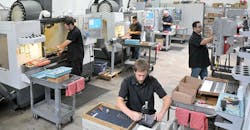I have always considered myself to be part of the solution.
Well, it turns out I might, in fact, be part of the problem.
After writing an article discussing how AI can help blue-collar workers, I got called to task by Jesse Z Melton, a process consultant at Harpers Ferry Toolworks.
“You are doing a great disservice to our industry,” he said, “by using the outdated term of blue collar. We are trying hard to attract the labor we need and using an outdated word that unfortunately conjures up images of undereducated, dirty, low paid, sweatshop jobs, is just not correct. These are high-tech jobs in clean environments and we have to get that message out.”
And it isn't just Melton that feels this way. Another reader also admonished me. “Stop saying blue collar. It’s demeaning. It’s rude. It’s insulting. It’s playing a bigger role than you think in preventing the U.S. from creating a new generation of workers and truly beginning the process of rebuilding its manufacturing heritage."
Aparna Mathur, a scholar at the American Enterprise Institute, a conservative think tank, told the Society of Human Resource Management that “younger workers are reluctant to take on these [blue-collar] positions because … parents perceive these jobs as requiring a lot of manual hard work, which for certain positions that have become more high-tech, is no longer true. The image of these jobs as being hard and ‘dirty’ often discourages people from applying.”
In my defense I never considered the term blue collar to be either outdated or negative in any way. I have had the privilege to tour many factories over the past fifteen years and have admired the people who are building things. In fact, at one of IndustryWeek’s Best Plants conferences a few years ago the CEO of an auto division said that he’s not the most important person in the organization; it's the person who is putting the brakes on your car that is the important one.
So, I began asking others for their take on this term. Dan Johnston, co-founder of WorkStep, who is helping companies find warehouse, manufacturing and trucking workers, doesn’t use the term either. He prefers industrial workers.
And when it comes to recruiting workers at technical schools, Professor Brenda Bouse from Maryville University doesn’t care for the term. “I think the term feeds into the stigma that manufacturing is dirty and that’s so far from the truth. Today manufacturing is full of technologies that are creating very cool products.”
Brousse stresses that the point is to encourage young workers, including women who wouldn’t normally consider manufacturing a career, that it’s a great career to enter, so we shouldn’t be using that term.
While not everyone would agree that the term is outdated, it does seem to be a groundswell of people who do.
For now, I’ll sidestep the larger issue, which I will explore another time, as to the divide among jobs (blue collar versus white collar) and how we should address this, and instead focus on updating this term.
Melton has a term he prefers --industrial artisans.
“Traditionally, dating back many years, the term artisans was used for those who made things with their hands. It wasn’t that long ago that we had an artisan society. It wasn’t segmented to blue collar but was broken up by guild masters, shop masters and apprentices. In modern times, in 1950, there were colleges of industrial arts,” explained Melton.
Changing the term is the first step in changing minds, says Melton.
“We need to send the message that manufacturing is a cool place to work,” says Melton.
But the messaging is going to take some time to sink in. The labor shortage will be with the sector for a long time. “It’s a long row to hoe and it’s a tough sell,” says Melton.
I certainly don’t want to make things worse by using outdated terms, so for my part, I would personally like to thank the industrial artisan who put the brakes on my car.
